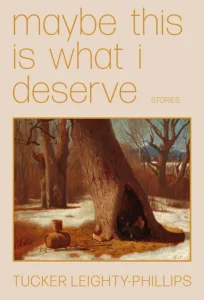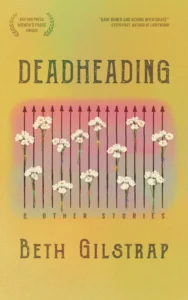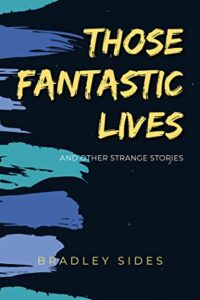Reviewed by Mariah Rigg | June 14, 2022
Red Hen Press, 2021
Paperback, 232 pages, $22.95
Beth Gilstrap’s Deadheading and Other Stories is a love letter to the Carolinas, a collection that takes the much-documented recession and remakes it through the eyes of the Southern working class. As someone who did not grow up in North America, this collection was a devastating look into 21st Century Southern life, with all its beauty and heartbreak.
In each of these twenty-two stories, Gilstrap writes about place as one would a family member. This relationship is introduced in the very first story, “Earth Eating As Suppression,” where a little girl, Reese, spends a February day collecting clay to make into mud pies with her grandmother. “Some folks won’t ever understand the desire to let the earth melt under the tongue, to let the thousands of microbes disseminate into the body, to suppress the unnamable pain growing in the belly,” Reese’s grandmother says as they eat. This statement acts as a thesis for the rest of the collection, shining a light on the stickiness of life in the Carolinas. Even though the earth suppresses pain, it does not heal; it does not provide the people who eat it power or agency. The characters of this collection are split between accepting the earth—like Reese and her grandmother—and rejecting the place they have been born to—like Reese’s mother, and so many characters we see throughout these twenty-two stories, have done and will do. Neither of these choices offers any safety, as to leave means to abandon home and community for gentrified city neighborhoods like the one in “Like Air, Or Bread, Or Hard Apple Candy,” and to stay means to risk being swallowed by routine, by the earth, as Ona’s mother is in “Sinking and Swaddled.”
Though the setting is familial and lovely, it is also violent. It presses dangerously in on Gilstrap’s characters, whether that is in the “remnants of a gulf-born hurricane” that mirrors the impending divorce of the couple in “The Denial Weeks,” “twenty storms beating the hell out of [Rae’s in-law’s] roof” in “The Gopher in Rae’s Chest,” or “the Gulf [that] took a big-ass breath and blew everything it had our way to prove we weren’t any more solid on higher ground” in “Still Soft, Still Whole.” Hints of the climate apocalypse weave through these stories, noticed by characters like Vicky in “Tomorrow or Tomorrow” who wonder “what it meant when Christmas was turbulent like May, wet like June” and Jane in “For a Blaze of Sight” who thinks of “squid and cuttlefish and octopus, who are reproducing at alarming rates in our warming oceans” as she flattens grass into shapes with her feet. Gilstrap’s characters are resigned to the fact that the anger of nature cannot and will not be avoided.
There are many ghosts in these stories, from Janine’s grandmother in the linked stories “No Matter How Fine” and “Sale Day” to Vicky’s best friend Cora, in “Tomorrow or Tomorrow.” In “Ain’t Nothing but Fire,” Hardy reflects on how life with his wife could have been different; “Maybe if Loretta could’ve sat still for five minutes like that she wouldn’t have turned everything to shit.” The residue of the past sticks to Gilstrap’s characters much like, “the glow-in-the-dark stars that [Janine and Maddies] stuck on [Janine’s] bedroom ceiling,” in “Sale Day.” It haunts them, and us. While much has been said about Gilstrap’s command of place, she should also be praised for her use of point of view and retrospection. The most successful stories in Deadheading embed us in the past, and then, when we are most claustrophobic, propel us into a future where the fever of that conflict has already boiled and broken, a future that has gone to pieces. In this way, Gilstrap’s stories do what the best of short fiction does: close a door behind us that cannot be reopened, write a world where things are never again the same.
Ultimately, it is the loss of the future that looms most in these stories, whether that is the larger catastrophe brought on by a warming earth, or the smaller losses of romantic relationships, furniture stores, and most often, a child’s “soft kind of joy you can’t find anywhere else.” Through this collection, Gilstrap’s characters teach us, “What makes a life and what makes the appearance of a life.” They beg us to, “Tell me the truth…Tell me the truth.” They lie their stories at our feet and say “here is what is left of me. Light receptors. Circadian rhythms. Muddy feet.” They invite us to mourn all that has been lost and all that we’ve still yet to lose.
ABOUT THE AUTHOR
Beth Gilstrap is the author of I Am Barbarella (2015) from Twelve Winters Press. She has an MFA from Chatham University. Her work has appeared in Best Microfiction Anthology 2019, Minnesota Review, Wigleaf, and others. She lives in Charlotte, North Carolina, with a house full of critters.
ABOUT THE REVIEWER
Mariah Rigg has an MFA from the University of Oregon. Her work has been published in The Cincinnati Review, Puerto del Sol, and elsewhere.






